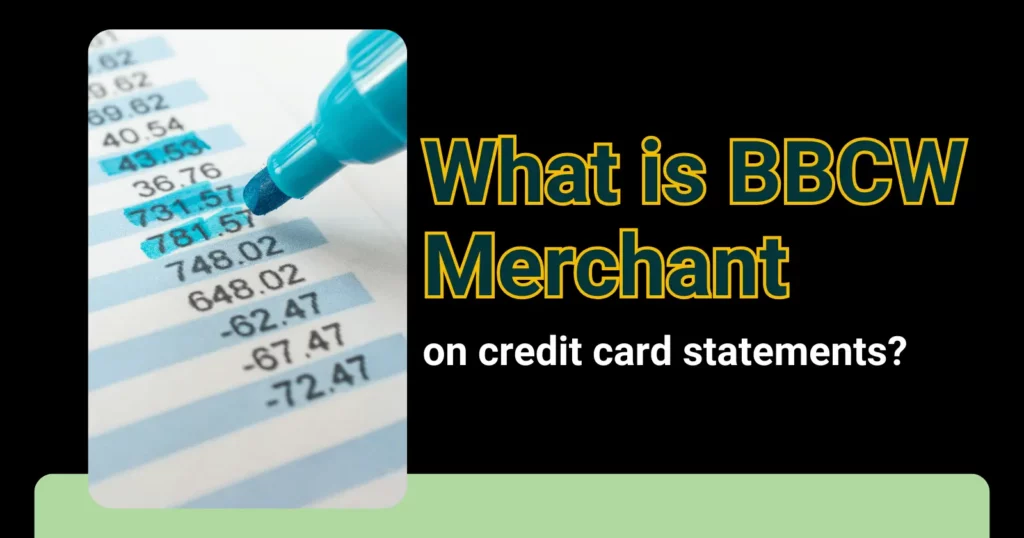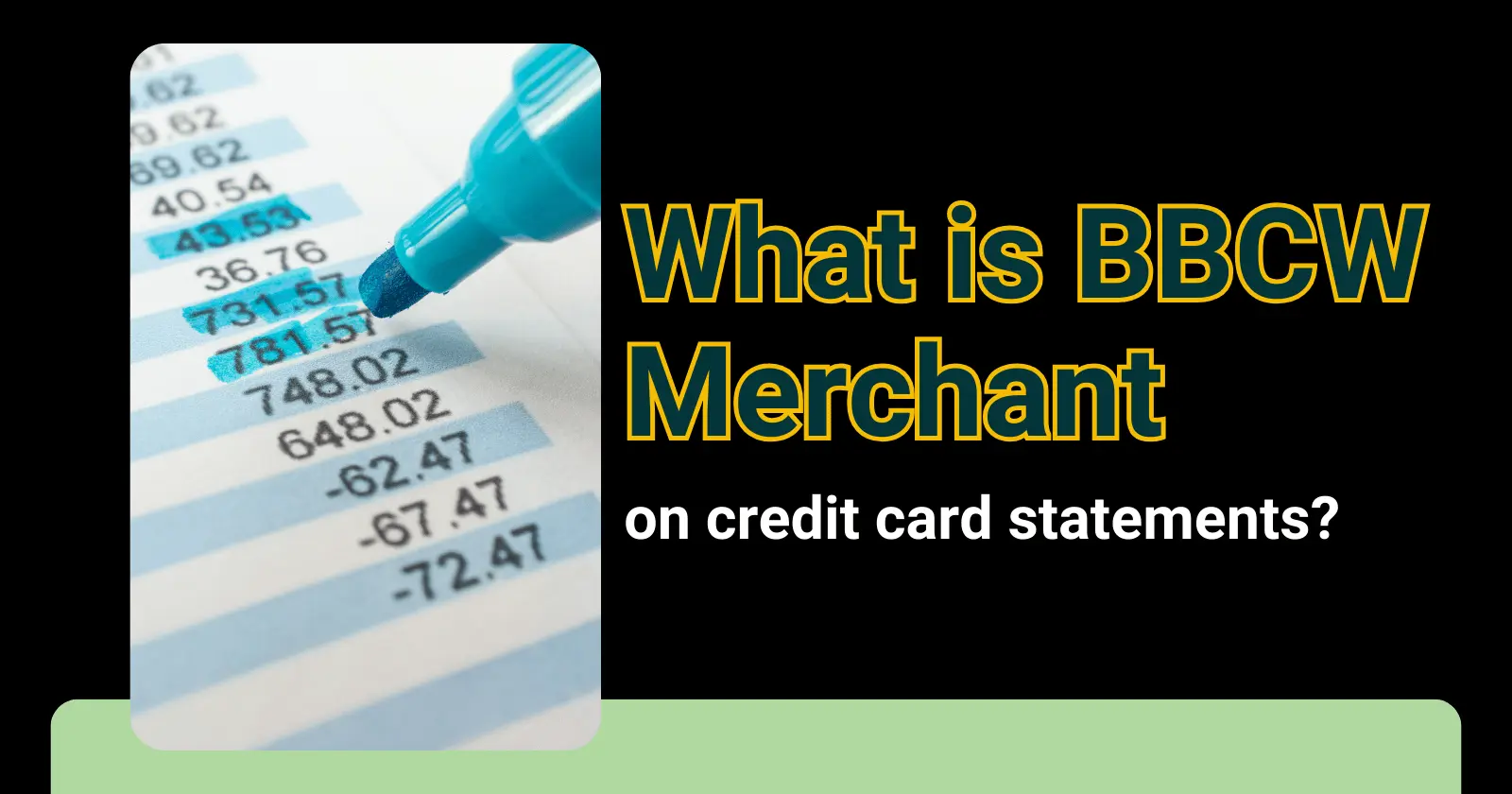In today’s digital age, managing your finances can sometimes feel like navigating a labyrinth. Credit card statements, in particular, can be a source of confusion with their often cryptic transaction descriptions.
One such puzzling entry that has left many cardholders scratching their heads is “what is bbcw merchant on credit card statement chase” If you’ve spotted this charge on your statement, particularly if you’re a Chase cardholder, you’re not alone.
Let’s dive deep into what BBCW Merchant means, why it appears on your statement, and what you should do if you encounter it.
What is BBCW Merchant on credit card statement?
BBCW Merchant is a descriptor that appears on credit card statements, representing a transaction with a specific type of retailer or service provider. The acronym “BBCW” doesn’t stand for a single company but can represent various businesses, often those related to online services, subscriptions, or digital content providers.
Why Does It Appear as BBCW Merchant?
Many companies, especially those operating in the digital space, use payment processors or parent company names for billing purposes.
This practice can lead to discrepancies between the brand name you recognize and the name that appears on your credit card statement. BBCW Merchant is one such generic descriptor used by multiple businesses.
BBCW Merchant on Chase Credit Card Statements
Chase, being one of the largest credit card issuers in the United States, processes millions of transactions daily.
If you’re a Chase cardholder and see BBCW Merchant on your statement, it’s important to understand that this isn’t unique to Chase. The same descriptor can appear on statements from other banks as well.
Common Scenarios for BBCW Merchant Charges
- Subscription Services: You might see this charge if you’ve signed up for a recurring subscription, such as a streaming platform, digital magazine, or online learning service.
- Digital Content Purchases: Buying e-books, digital games, or other online content could result in a BBCW Merchant charge.
- Online Retailers: Some e-commerce platforms use this descriptor for billing purposes, especially if they’re part of a larger corporate structure.
- App Store Purchases: In-app purchases or app downloads might sometimes be processed under this name.

What to Do If You Don’t Recognize the Charge
If you see a BBCW Merchant charge on your Chase credit card statement (or any other bank’s statement) that you don’t recognize, don’t panic. Here are the steps you should take:
- Review Recent Purchases: Go through your recent online transactions and subscriptions. The charge might be from a service you forgot about or didn’t realize used this billing name.
- Check the Amount: Sometimes, the amount can jog your memory about a recent purchase.
- Contact Chase Customer Service: If you’re still unsure, reach out to Chase’s customer service. They can provide more details about the merchant and the transaction.
- Use Chase’s Online Tools: Log into your Chase online account or mobile app. Often, you can find more detailed transaction information here.
- Dispute the Charge if Necessary: If you’re certain you didn’t make the purchase, you can initiate a dispute through Chase’s official channels.
Protecting Yourself from Unauthorized Charges
While BBCW Merchant charges are often legitimate, it’s always wise to stay vigilant about your financial security. Here are some tips:
- Enable Transaction Alerts: Set up notifications for all purchases on your Chase card.
- Regularly Review Your Statements: Make it a habit to go through your credit card statements line by line.
- Keep Track of Subscriptions: Maintain a list of all your recurring payments and their billing descriptors.
- Use Virtual Card Numbers: For online purchases, consider using virtual card numbers provided by Chase for added security.
When to Be Concerned
While most BBCW Merchant charges are legitimate, there are instances where you should be cautious:
- Multiple Charges: If you see repeated BBCW Merchant charges that you can’t account for.
- Unusual Amounts: Charges that don’t match any of your typical spending patterns.
- Unfamiliar Dates: Transactions on dates when you’re certain you made no purchases.
In these cases, don’t hesitate to contact Chase immediately and consider placing a temporary freeze on your card until the issue is resolved.
Frequently Asked Questions About Merchant Statements
How can I effectively use my merchant statement for reconciliation?
To reconcile your business payments, start with the Funding Summary section of your statement. This provides a quick overview of your daily funding from Chase Merchant Services. For more detailed information, refer to specific sections like Chargebacks & Reversals or Financial Adjustments as needed. Remember, merchant statements are divided into seven main sections: Deposit Summary, Funding Summary, Credit Card Summary, Tax Information, Chargebacks & Reversals, Financial Adjustments, and Charges & Fees.
Why didn’t I receive my merchant statement?
There are several reasons you might not have received your statement: 1) Your email address on file is incorrect for e-statements, 2) Your mailing address is outdated for paper statements, or 3) You had no payment processing activity for the month. If you suspect an issue with your contact information, please reach out to your Relationship Manager or call 800.934.7717 to update your records.
Can I access my merchant statements online?
Yes, you can access your merchant statements online through Chase business online. Simply visit chase.com/business to set up your profile or sign in to your existing account. This provides instant access to your statements electronically as soon as they become available.
How does my billing cycle impact my charges and fees?
Your billing cycle determines when Chase Merchant Services charges you for their services. Most merchants are on daily, weekly, or monthly cycles. For example, on a monthly cycle, January’s processing fees would be debited in early February and appear on February’s statement. If you’re unsure about your billing cycle, contact support at 800.934.7717 for clarification.
What is an account minimum fee and why was I charged?
An account minimum fee is charged when your business doesn’t meet the agreed-upon transaction volume specified in your contract. This fee ensures a minimum level of revenue for the payment processor. Check your pricing schedule (often called Schedule A) in your contract for your specific minimum processing requirements.
Why don’t I see all my individual sale/refund transactions on my statement?
Merchant statements provide a summary of your financial activity rather than a detailed list of every transaction. Due to space limitations, individual transactions are not displayed. For a more detailed view of your transactions, consider using online reporting tools or contacting customer support.
What causes a negative amount transferred in the Funding Summary section?
A negative amount in the Funding Summary occurs when the total of all deductions from your account (including refunds, fees, and adjustments) exceeds the total amount of positive sales activity for that period. This situation may require careful review of your account activity.
What’s the difference between a chargeback and a reversal?
A chargeback is when a transaction is reversed, either partially or fully, typically initiated by the card-issuing bank. This can happen due to technical issues or at the cardholder’s request. A reversal, on the other hand, is when a chargeback is canceled, returning the funds to the merchant’s account.
Why is there a Tax ID Number section on my statement?
The Tax Information section was added to comply with IRS requirements. It informs you whether action is needed to ensure the Tax ID Number (TIN) on file matches IRS records. This helps prevent potential tax reporting issues for your business.
Why can’t my statements be emailed to multiple addresses?
To maintain the security of your sensitive financial data, merchant statements are limited to a single email address. This policy helps prevent unauthorized access and ensures that your confidential information is protected.
Conclusion
Understanding credit card statement descriptors like BBCW Merchant is crucial in managing your finances effectively. While it can be confusing at first, most of these charges are legitimate and can be traced back to your actual purchases or subscriptions. For Chase cardholders and customers of other banks alike, the key is to stay informed, keep track of your spending, and not hesitate to seek clarification when needed.
Remember, your financial institution, whether it’s Chase or another bank, is there to help you navigate these waters. By staying vigilant and using the tools and services provided by your bank, you can ensure that your credit card usage remains secure and transparent.
By understanding what BBCW Merchant means on your credit card statement, you’re taking an important step in maintaining control over your financial life in our increasingly digital world.
